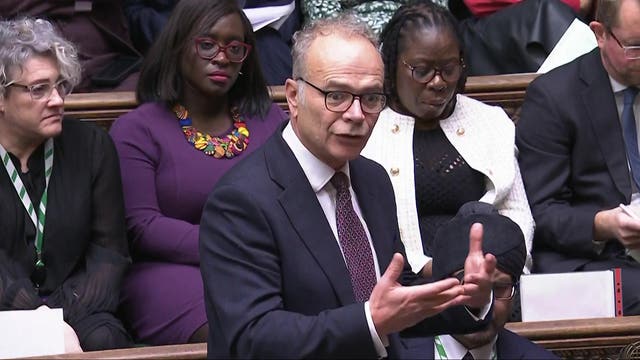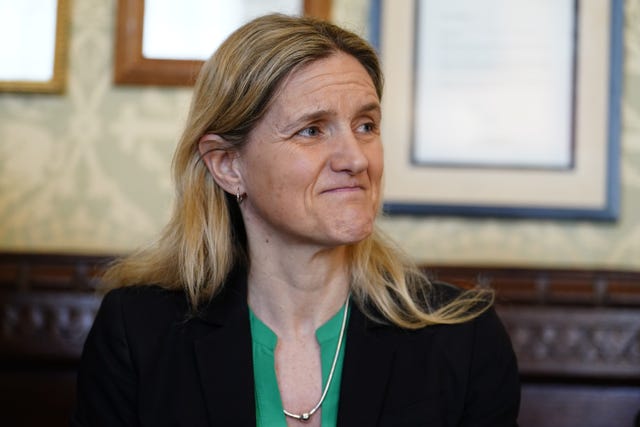Doctors raise concerns over assisted dying Bill ahead of return to Parliament
The Bill, which relates to England and Wales, will come before MPs in the House of Commons on Friday for its report stage.

An MP who backs the assisted dying Bill has insisted many of his colleagues have not changed their views on the issue, as GPs and psychiatrists raised concerns days before the legislation returns to Parliament for debate.
In what will be seen by some as a blow for the Terminally Ill Adults (End of Life) Bill, the Royal College of Psychiatrists (RCPsych) said it cannot support the proposals in their current form, while separate research has highlighted division on the issue amongst family doctors in England.
The Bill, which relates to England and Wales, will come before MPs in the House of Commons on Friday for its report stage – where various further amendments will be debated and voted on.
It is not yet clear whether time will allow on the day for a third reading vote.

It will be the first time the Bill is back before the Commons since the historic yes vote in November.
The Bill’s continued passage through Westminster comes as the Scottish Parliament backed the general principles for assisted dying in a vote on Tuesday.
Holyrood voted by 70 votes to 56 in favour of the Assisted Dying for Terminally Ill Adults (Scotland) Bill.
On the Westminster Bill, the Royal College of Psychiatrists (RCPsych) has said it cannot support the proposed legislation in its current form, highlighting “serious concerns”.

Conservative MP Danny Kruger, who is opposed to the Bill, said this was a “very significant intervention”, and Labour’s Melanie Ward, who also voted against it, said it was a “blow to (the Bill’s) foundations”.
The college said it has “unanswered questions” about the safeguarding of people with mental illness and warned of a shortage of consultant psychiatrists to meet the demands of the Bill.
Meanwhile, research by the BBC suggested varying views among GPs.
Of 1,000 doctors who responded to questions on assisted dying, 500 were opposed to legalisation while about 400 were in favour, the broadcaster said.
Professor Kamila Hawthorne, chair of the Royal College of GPs, told the BBC the results showed doctors had “real concerns about the practical and legal implications of a change in the law on assisted dying”, which she said “must be acknowledged and addressed, so that any legislation is watertight”.
The Bill was amended during committee stage earlier this year, including the High Court element being scrapped in favour of multidisciplinary panels featuring a social worker, senior legal figure and psychiatrist.
The RCPsych has said it is “not clear what a psychiatrist’s role on a multidisciplinary panel would be”, and also demanded any new law “must exclude the physical effects of mental disorder, such as anorexia or dementia, as the basis for eligibility”.
Dr Lade Smith, president of the RCPsych, said: “It’s integral to a psychiatrist’s role to consider how people’s unmet needs affect their desire to live. The Bill, as proposed, does not honour this role, or require other clinicians involved in the process to consider whether someone’s decision to die might change with better support.

“We are urging MPs to look again at our concerns for this once-in-a-generation Bill and prevent inadequate assisted dying/assisted suicide proposals from becoming law.”
Dr Annabel Price, also from the RCPsych, said: “The college has spent decades focused on preventing people from dying by suicide.
“A significant part of our engagement on this Bill to date has been to point out that people with terminal physical illnesses are more likely to have depression.
“Terminal illness is a risk factor for suicide, and unmet needs can make a person’s life feel unbearable. But we know that if a person’s situation is improved or their symptoms treated, then their wish to end their life sooner often changes.
“The Bill does not specify whether assisted dying/assisted suicide is a treatment option – an ambiguity that has major implications in law.”
Labour MP Simon Opher, who is also a GP and is supportive of the Bill, said the legislation has been amended to be even safer than it was.
He told the BBC Radio Four Today programme: “I totally understand the criticisms around the Bill but I think that actually if you read the Bill it’s incredibly safe now and it has a number of safeguards around capacity and coercion and indeed that’s why we’ve involved psychiatrists for the very difficult cases around assessing mental capacity – which are very few but we need their expertise on that level.”
Asked whether he felt concerns raised by royal colleges might put MPs off voting in favour of the Bill, he said: “GPs are split on this and I totally acknowledge that and I know many people who I deeply respect who are against it and many who are for it.
“But I think that actually talking to MPs, many of them haven’t changed their views on this.
“There’s about three or four I know that may vote in favour of the Bill because of the extra safeguards we’ve built into it.”
Meanwhile, Kim Leadbeater, the MP behind the Westminster Bill, praised the “lengthy, constructive and compassionate debate” in the Scottish Parliament, saying they had “listened to the voices of those with personal experience of those injustices and concluded that the status quo cannot be defended any longer”.





